Your Guide to Rental of Condo in Singapore
Master the rental of condo in Singapore with our expert guide. Navigate budgeting, viewings, and contracts to find your ideal home with confidence.
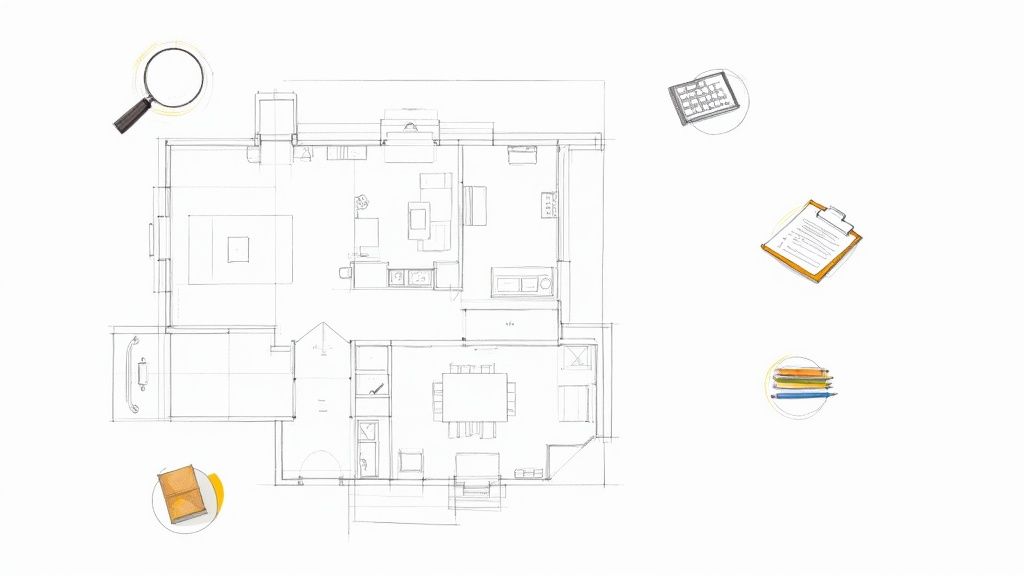
Navigating Singapore's fast-paced rental market to find the perfect condo can feel like a daunting task, but it really doesn't have to be. Think of this guide as your personal roadmap, designed to break down the entire process into simple, straightforward steps. We'll walk through everything together, from figuring out your budget to finally getting those keys in your hand.
Getting a Feel for the Singapore Condo Rental Scene
If you're looking to rent a condo in Singapore, you're jumping into a market that's both exciting and incredibly efficient. It's not like renting in many other major cities around the world. Here, the process is very structured, which is actually a good thing. It revolves around key documents like the Letter of Intent (LOI) and the Tenancy Agreement (TA), all designed to protect both you and the landlord.
It's a hot market, too. The global real estate rental scene is booming—valued at around USD 2.91 trillion in 2025 and expected to hit USD 3.87 trillion by 2029. This trend, driven by rising home prices and a desire for more flexible living, definitely makes its presence felt in a global hub like Singapore. You can dig deeper into these trends on Research and Markets.
What to Expect on Your Journey
Finding your next home is more than just scrolling through online listings. To come out on top, you need to be prepared for every stage of the game.
Here's a quick look at what we'll cover:
- Getting Your Finances in Order: We'll break down the total cost beyond just the rent, including the security deposit, stamp duty, and any agent fees.
- The Property Hunt: I'll share my tips for using online portals to find great listings that actually fit what you're looking for.
- Making the Most of Viewings: It’s about knowing what to look for and what crucial questions to ask—the ones most people forget.
- Negotiating Your Lease: We'll go over the key clauses in a tenancy agreement so you can protect yourself and your interests.
- The Final Stretch: From handling the paperwork and inventory checks to ensuring your move-in day is completely stress-free.
Knowing what’s coming transforms the entire rental experience. Instead of being a source of stress, it becomes an exciting new chapter. Your best tool in this market is simply being well-informed.
To get a broader perspective on renting, it's worth checking out a complete guide to renting an apartment successfully, as a lot of the core principles are universal. My aim here is to give you that insider knowledge, helping you sidestep common pitfalls and make smart, confident decisions every step of the way.
Figuring Out Your Budget and Starting the Hunt
Before you get lost in a sea of gorgeous property photos, let’s talk numbers. It’s easy to get excited, but grounding your search in a solid financial plan from the get-go will save you a world of headaches later. The monthly rent is just one piece of the puzzle.
When you sign the lease, you’ll need more than just the first month's rent ready to go. The biggest upfront cost is the security deposit. For a one-year lease, this is almost always one month’s rent. If you sign for two years, expect to put down two months' rent. The good news? You get this back at the end of your tenancy, assuming you’ve kept the place in good shape.
Then there’s the stamp duty, a mandatory tax paid to the Inland Revenue Authority of Singapore (IRAS) on your tenancy agreement. It’s a legal must-do, and the amount is calculated based on your rent and the length of your lease. Don't forget to factor this into your initial budget.
A Quick Word on Agent Commissions
If you’re working with a property agent, you need to be clear on how they get paid. In Singapore, there’s a common practice: if the monthly rent is above a certain amount (usually S$3,500), the landlord’s side covers the commission for both agents.
However, if your rent falls below that line, you may need to pay your agent's commission yourself. This is typically half a month's rent for a one-year lease. Just ask about this right at the start to avoid any awkward conversations down the line.
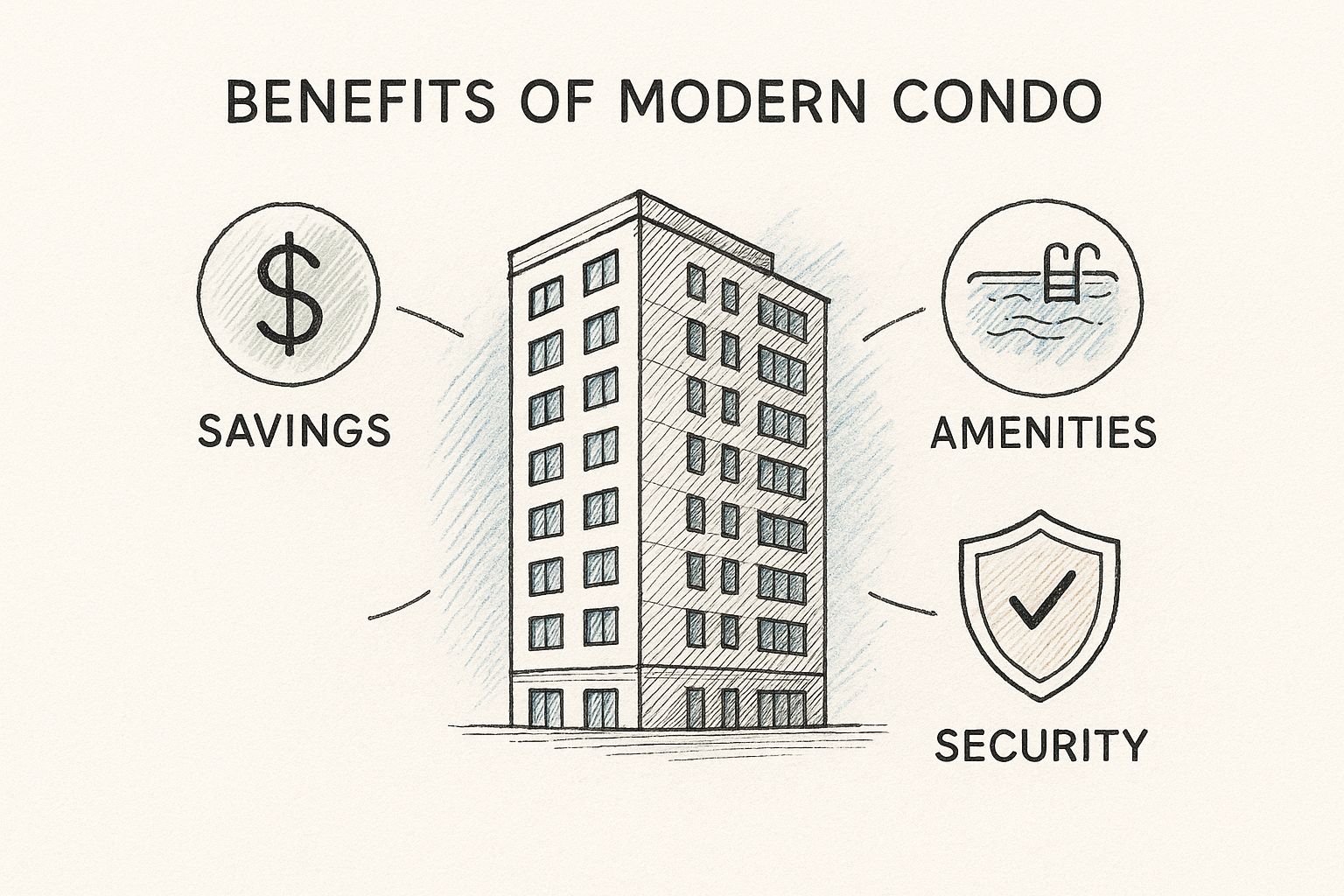
As the visual above shows, finding the right place is about balancing your budget with the amenities and security that matter most to you.
Here’s a practical look at the one-time and ongoing costs you can expect when renting a condo in Singapore. Use this to build your own budget.
Sample Budget for a Singapore Condo Rental
| Cost Item | Typical Amount or Calculation | What You Need to Know |
|---|---|---|
| Security Deposit | 1-2 months' rent | Refundable at the end of the lease, minus any repair costs for damages. |
| First Month's Rent | The agreed monthly rental rate | Paid in advance before you move in. |
| Stamp Duty | Calculated based on lease term and rent | A one-time tax paid to IRAS. Your agent will handle the calculation. |
| Monthly Rent | The agreed monthly rental rate | Paid on the same day each month as stipulated in your agreement. |
| Utilities (SP Group) | S$100 - S$400+ per month | Covers electricity, water, and gas. Varies wildly based on your A/C usage. |
| Internet & TV | S$50 - S$100+ per month | Packages vary by provider (Singtel, StarHub, etc.). |
| Minor Repairs | S$150 - S$250 per incident | Most leases state the tenant covers minor repairs up to a certain amount. |
This breakdown should give you a much clearer picture of the total financial commitment beyond just the advertised monthly rent.
Where to Actually Find Your New Home
With a realistic budget in hand, the real fun begins. The go-to property portals in Singapore are undoubtedly PropertyGuru and 99.co. They’re fantastic resources, but they can also feel like an endless scroll if you don’t have a clear strategy.
Your best friends on these sites are the filters. Go beyond the basics like price and number of bedrooms. Get specific to really narrow things down:
- Proximity to an MRT Station: Don’t just look for a place in a general area. Filter by specific MRT lines or stations that make your commute a breeze. Living near a major hub can be a game-changer, and our guide on what it’s like renting a condo in Marina Bay offers some great insights into the benefits of a prime location.
- Must-Have Amenities: Are you a swimmer? A gym enthusiast? Do you need a tennis court? Filter for your non-negotiables.
- Furnishing Level: Decide if you need a fully furnished, partially furnished, or unfurnished unit. This choice significantly impacts both the rent and your moving-in costs.
Expert Tip: A classic rookie mistake is getting excited about a listing that’s been online for weeks. The Singapore rental market moves incredibly fast—the best units are often gone in days. Always sort your search results by "Newest" to see what’s fresh on the market and avoid chasing ghosts.
This targeted approach will save you countless hours and ensure you only spend time viewing properties that are a genuine fit. It's the smart way to navigate a market where affordability is a real concern—data shows that over 50% of renter households in some markets spend more than the recommended 30% of their income on housing. Staying focused and budget-conscious is more important than ever.
What to Look for When You’re Viewing the Condo
Online listings are designed to impress. They're the highlight reel. The in-person viewing? That’s the reality check. This is your one real shot to get past the wide-angle lenses and professional staging to see what a place is really like. Finding a great condo rental often boils down to what you spot during this crucial walk-through.
Don't get distracted by the infinity pool view or the fancy Italian marble. Your job is to be a bit of a detective. You need to test everything you’ll be touching and using every single day. It might feel a little odd opening and closing every cabinet, but trust me, a few minutes of thoroughness now will save you from months of headaches later. You're making sure the lifestyle promised is the lifestyle you'll actually get.
The Hands-On Functionality Test
Start with the basics—the little things that can become huge annoyances if they aren't right.
- Check the Water Pressure: Go into every bathroom and turn on the showers. Are you getting a strong, satisfying stream or a sad little trickle? Do the same with every tap, including the kitchen sink.
- Test the Air-Conditioning: This is a big one in Singapore. Turn on every single A/C unit. Yes, all of them. Let them run for at least 5-10 minutes. Do they blow cold air? More importantly, listen for any weird rattling or loud humming sounds. That’s often the sign of an old unit on its last legs.
- Check Your Phone's Signal: Walk around the entire apartment, from the living room to the master bedroom and even into the bomb shelter, and keep an eye on your phone's signal bars. A dead zone right where you plan to set up your home office is a deal-breaker for many.
- Inspect the Appliances: If the condo comes with appliances, give them a quick once-over. Open the fridge and freezer, turn on the oven, and maybe even run a quick rinse cycle on the dishwasher if you can. It's also smart to ask how old they are. Anything over 5-7 years might be nearing replacement time.
A viewing isn’t just a visual tour; it’s an interactive experience. You have to physically use the fixtures and test the systems to get a true feel for the condo's condition. A picture can’t tell you if the water pressure is terrible.
The Must-Ask Questions for the Agent
After you’ve done your own hands-on inspection, it’s time to grill the agent or landlord. Their answers will tell you a lot about how the property has been cared for and what to expect as a tenant. For instance, if you were looking at a high-end unit like one in our review of Orchard Scotts Residence, you'd expect a well-documented and transparent history.
Here are a few questions you should never leave without asking:
- Which exact pieces of furniture are staying? The place might be fully furnished for the viewing, but that doesn't mean everything is included. Get a clear list of what stays and what goes to avoid a nasty surprise on move-in day.
- Are there any known issues, or have there been any recent major repairs? This question can reveal recurring problems, like plumbing leaks or A/C breakdowns, and gives you a good idea of the building's overall maintenance.
- Which way does the afternoon sun hit? This is a classic Singapore question. A west-facing unit can turn into an oven in the afternoon, which means your electricity bills for air-conditioning will be significantly higher.
- Who is responsible for air-con servicing and general maintenance? Get this clarified from the start. The standard practice is for tenants to cover quarterly A/C servicing, but it's always best to confirm.
Taking this hands-on approach ensures you're not just renting a pretty space, but a home that is functional, comfortable, and free of stress.
Making an Offer and Understanding the Lease
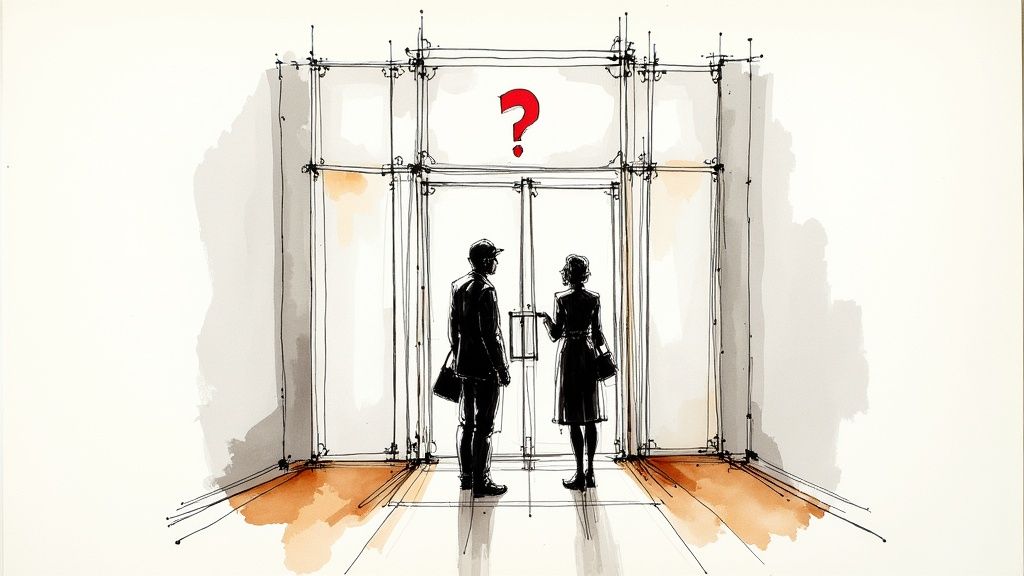
You’ve found it—the condo that feels like home. In Singapore's fast-moving rental market, you need to act quickly and strategically. The first official step is submitting a Letter of Intent (LOI).
This document formally tells the landlord, "I'm serious about renting your property." It outlines the core terms of your offer and kicks off the negotiation process. While it's not the final binding contract, a sharp, well-presented LOI can make you stand out from the crowd and show the landlord you mean business.
Crafting a Compelling Letter of Intent
Your LOI is more than just a price and a date; it's your opening move. Keep it professional and clear. The basics will include your offered monthly rent, your desired move-in date, and the lease term (typically one or two years).
But this is also your chance to negotiate the finer points that can make a huge difference in your day-to-day life. Think about what would make the place perfect for you.
Here are a few common requests I've seen clients successfully negotiate:
- A Fresh Start: Ask for the landlord to arrange a professional cleaning of the entire unit before you move in. This should include details like deep-cleaning the air-conditioning systems and steam-cleaning the curtains.
- Fixing the Little Things: Did you spot scuffed paint on a wall or a dripping tap during your viewing? Mention these minor repairs in the LOI. It's best to get these agreed upon upfront.
- Furniture Requests: Maybe the apartment is perfect, but the WFH setup is lacking. It's perfectly reasonable to ask the landlord if they would be willing to provide a new desk and chair.
The LOI is your best opportunity to shape the deal. Landlords are often willing to accommodate reasonable requests to secure a reliable, long-term tenant. Don't be shy about asking for what you need.
After you submit the LOI, the ball is in the landlord's court. They might accept your terms, reject the offer, or come back with a counter-offer. A bit of back-and-forth negotiation is completely normal, so be ready for a short discussion to land on a deal that works for everyone.
Dissecting the Tenancy Agreement
Once you and the landlord have agreed on the terms in the LOI, you'll receive the Tenancy Agreement (TA). This is the big one—the official, legally binding contract for your condo rental.
I can't stress this enough: you must read every single clause before you sign. Don't just skim it. This document governs your entire stay, your responsibilities, and your rights.
Most TAs in Singapore follow a standard template, but the devil is always in the details. Pay extra attention to a few critical clauses that protect you as a tenant.
Here’s what to zero in on:
- The Diplomatic Clause: If you're an expatriate, this is non-negotiable. This clause gives you the right to terminate your lease early (usually after a minimum stay of 12 months) if your company transfers you out of Singapore or if your employment is terminated. Without it, you could be on the hook for rent for the rest of the lease.
- Maintenance and Repair Clause: This section spells out who pays for what. The standard practice is that the tenant covers minor repairs up to a set amount, often S$150 to S$200 per item. The landlord is responsible for anything beyond that, including major appliance failures like the air-con compressor or water heater.
- End-of-Lease Terms: Understand exactly what's expected when you move out. The TA will specify the condition the property must be returned in—usually the same condition as received, minus "fair wear and tear." It will also outline the timeline and process for getting your security deposit back.
Securing Your Lease and Handling the Paperwork
You’ve found the perfect place and agreed on the terms—congratulations, you're on the home stretch! Now it’s time to navigate the final bit of admin that makes it all official. This part is about dotting the i's and crossing the t's, from making payments to signing the legal documents that will lead to a smooth handover.
First things first, you'll need to pay the security deposit and the first month’s rent. This usually happens right when you sign the Tenancy Agreement, typically through a bank transfer. A word of advice: always, always get an official receipt from the landlord or their agent. Think of it as your financial safety net.
Don't Forget the Stamp Duty
Here’s a step that trips up a lot of first-time renters in Singapore: paying the stamp duty. This is a tax on your lease document that's paid to the Inland Revenue Authority of Singapore (IRAS). If you skip this, your Tenancy Agreement isn't admissible in a Singapore court, which means it’s practically useless if a dispute ever comes up.
Your agent should handle the calculation and payment for you, but ultimately, it's on you to make sure it's done within 14 days of signing. The amount is based on your rent and lease length, but it’s a small, one-time fee that officially legitimizes your rental agreement.
Think of the stamp duty as the government's official seal on your lease. It's a minor cost for the major legal protection and peace of mind you get in return.
The Handover: Your Most Important Walkthrough
Once the money and legalities are sorted, you’re ready for the handover. This is arguably one of the most critical moments of the entire rental process, so don't rush it. The landlord or their agent will walk you through the condo and present you with a detailed inventory list.
This document is meant to be a comprehensive record of everything in the unit—from the washing machine and sofa down to the exact number of forks in the drawer. It also documents the property's condition before you move in.
Here’s how to make sure you’re covered:
- Be Meticulous: Go through that inventory list with a fine-tooth comb. Check every single item to ensure it's there and in the condition described.
- Become a Photographer: Pull out your phone and take photos and videos of everything. Get close-ups of any pre-existing issues—a scratch on the floor, a scuff mark on the wall, or a stain on the couch. You can't have too much evidence.
- Document Everything: If you spot anything that's not on the list or is damaged, note it directly on the inventory form before you sign. This signed document, along with your photo library, will be your best friend when it comes to getting your full security deposit back down the road.
Getting Ready for Move-In Day
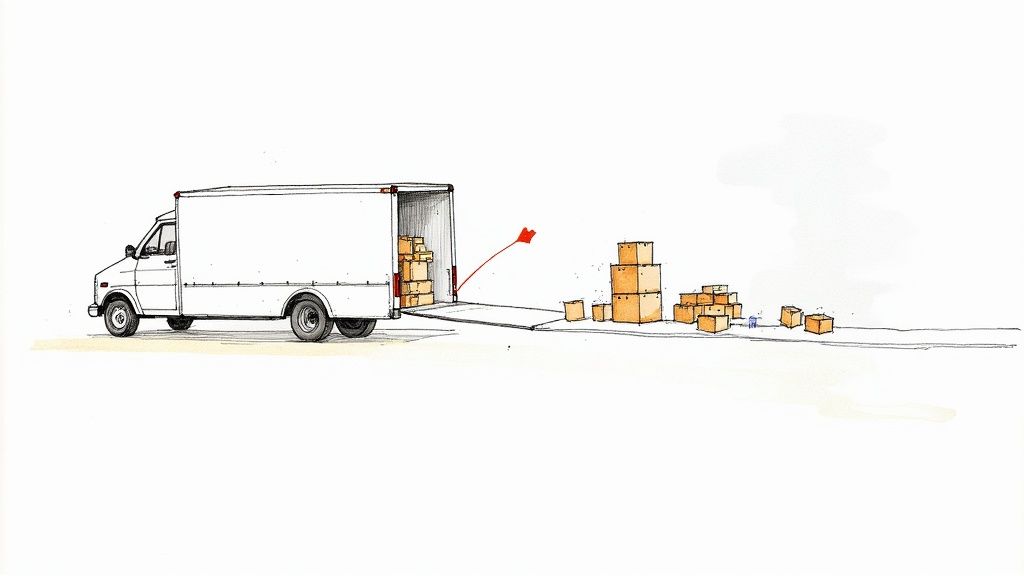
The ink on the lease is dry, and the keys are almost yours. The final hurdle? The move itself. A smooth move-in day isn't about luck; it's all about planning ahead.
Before a single box is loaded, get your essential services sorted. You can typically arrange for electricity, water, and Wi-Fi online well before your move-in date. Trust me, having the lights and internet working the moment you step inside makes all the difference between a chaotic first day and a comfortable start.
Touch Base with Condo Management
Luxury condos in Singapore have their own set of rules for moving in, and you'll want to be on top of them. The big one is almost always booking the service lift, also known as the loading or cargo lift.
Give the condo management office a call at least a week or two in advance to secure your slot. Moving day is a popular time, and you don't want to be stuck waiting.
While you're on the phone, ask about their specific policies for movers. Some buildings have strict moving hours or require movers to check in with security. A five-minute conversation can save you hours of headaches and delays. For a comprehensive guide to keep things on track, an ultimate residential moving checklist is an absolute lifesaver.
Pro Tip: When you call to book the lift, take a moment to introduce yourself to the condo management staff. Starting off on the right foot makes everything—from future maintenance requests to general queries—so much easier.
Settle In and Explore
Once the last box is inside, the real fun begins. The demand for urban condos, especially one- and two-bedroom units, has skyrocketed, driven by professionals who want to be close to the action. A well-organized move means you can start enjoying that city lifestyle faster.
Take a walk around your new neighbourhood. Pinpoint the nearest grocery store, find a great local coffee spot, and figure out the quickest route to the MRT station. It’s these little discoveries that truly start to make a new condo feel like home.
Common Questions About Renting a Condo
Even the most straightforward guide can't cover every question that pops up when you're in the middle of a condo hunt. I've been doing this for years, and a few key questions always come up. Let's get them answered so you can move forward with confidence.
Getting Your Security Deposit Back
This is a big one. You'll be happy to know that landlords in Singapore are legally required to return your security deposit within 14 days after your lease ends, assuming everything is in order.
The absolute best way to protect yourself and ensure a smooth return is to be meticulous on move-in day. Take photos and make detailed notes on the inventory list. This document is your proof if any disputes over damages arise later.
Are There Any Rental Caps?
You might hear about rental caps or rent control in other major cities, but that's not how things work in Singapore's private condo market. It’s a pure supply-and-demand situation, which is why prices can fluctuate.
The Million-Dollar Question: What if I Need to Break My Lease?
Life happens, and sometimes you have to move unexpectedly. This is where the fine print in your Tenancy Agreement becomes critically important.
If you have a diplomatic clause, you're in a much better position. This clause is designed for expatriates and usually allows you to terminate your lease after 12 months if you're transferred out of the country by your employer.
Without that clause, breaking the lease can be a costly affair. You could lose your entire security deposit and might even be on the hook for the rent until the landlord finds a new tenant. It's essential to talk through potential exit scenarios with your agent before you sign anything.
Understanding the nuances of your lease isn't just about following rules. It’s about protecting your financial interests and giving yourself flexibility in a dynamic city like Singapore.
Who Pays for Repairs and Maintenance?
Renters often wonder where the line is drawn for maintenance responsibilities. It’s actually quite clear-cut.
- Your responsibility: Day-to-day upkeep falls on you. This includes things like changing light bulbs and arranging for quarterly air-con servicing (a standard requirement in most leases).
- Landlord's responsibility: Major structural or appliance repairs are the landlord's problem. If the water heater goes out or the refrigerator breaks down, that’s their cost to bear.
Clarifying this from the start prevents a lot of headaches down the road. And remember, the right property often depends on the right location. To get a better feel for your options, check out our deep dive into the best neighbourhoods in Singapore for renters for some valuable local insights.
At UPPERHOUSE at Orchard Boulevard, we understand that finding the perfect luxury rental is about more than just the property—it's about the lifestyle and peace of mind. Discover an unmatched living experience in the heart of Singapore. Learn more about leasing opportunities at https://upperhouse.luxurycondo.sg.
Related Articles
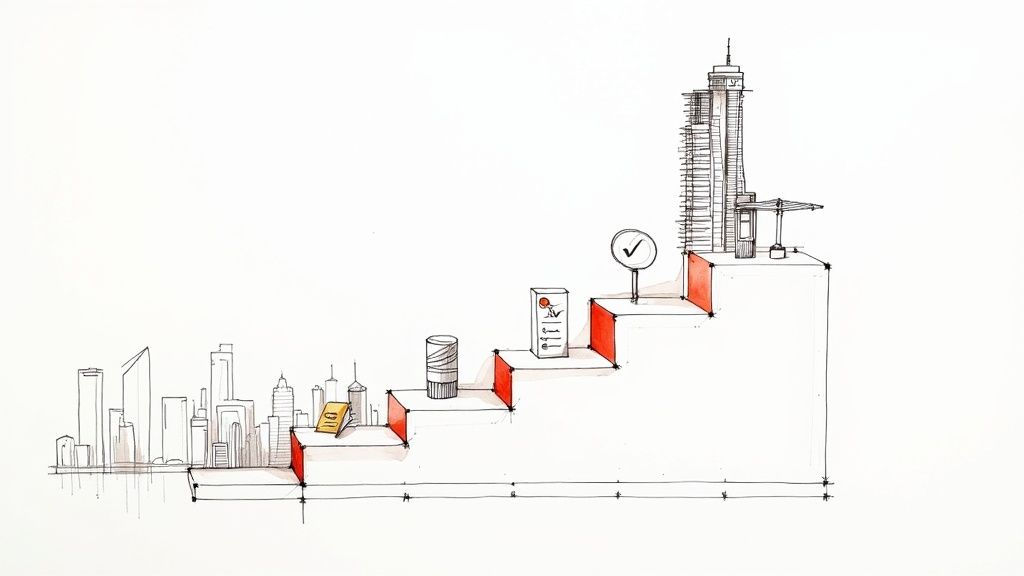
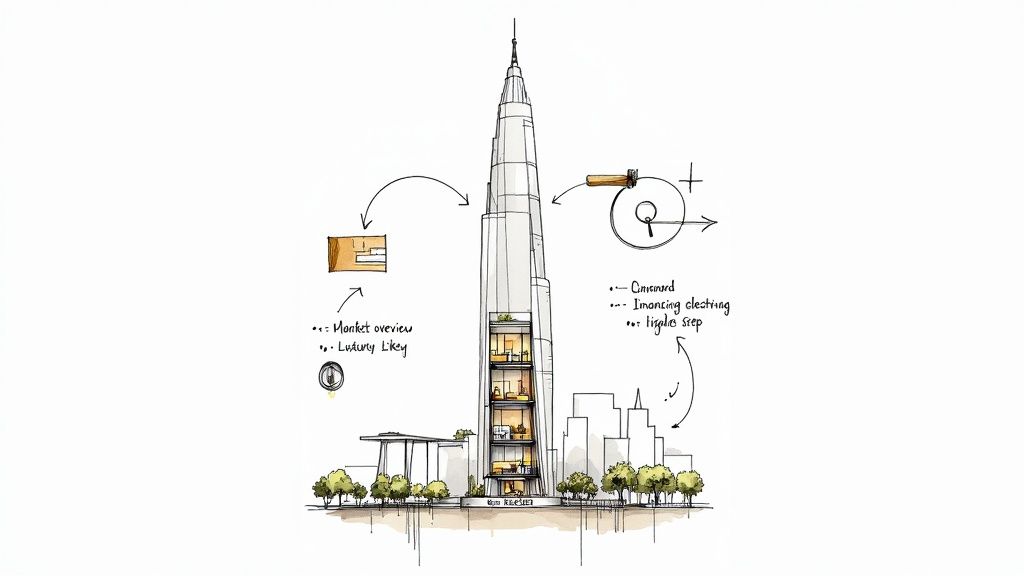

Interested in UPPERHOUSE?
Discover luxury living at UPPERHOUSE at Orchard Boulevard. Get exclusive updates and be the first to know about availability.